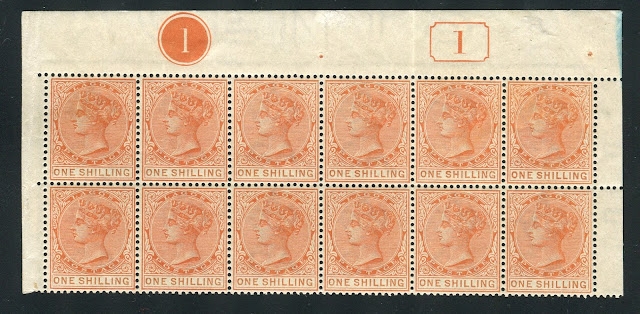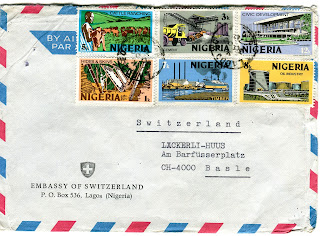Today I wanted to share my thoughts for those of you non-stamp collectors about why I think stamp collecting is the most awesome hobby in the world.
I start by examining the purpose of most hobbies. Hobbies generally are a way for us to relax doing something that interests us without any standards and goals beyond those which we determine for ourselves. There are many different kinds of hobbies, but most fall into the following categories:
1. Hobbies that involve collecting something.
2. Hobbies that involve creating something.
3. Hobbies that involve experiencing something.
In all cases, the hobby activity stimulates our senses - smell, sight, touch, hearing, as well as our exercising and engaging our minds. Most people find comfort in one of the above categories and occasionally one encounters individuals whose hobbies span all three. Most hobbies have a life cycle:
1. Dabbling
2. Increasing the intensity of interest and goal setting
3. Pursuing the goal intensely or casually
4. Savouring the accomplishment
5. Moving on to another hobby
We start dabbling in a hobby that we think we might like to see if our interest takes hold. At that stage, we have no goals associated with it and are strictly focused on the fun of it. Many hobbies never progress beyond this stage, being abandoned in favour of something that the person finds more interesting. Assuming that a person's interest takes hold, then there is usually an increase in the intensity with which the hobby is pursued. Perhaps the individual becomes a member of a club, or associates with other people who hold the same interest, or they identify a specialty within their hobby that they like the most, or a particular creative outlet that they want to pursue. Eventually, the hobbyist begins to consciously and unconsciously set goals about what they want to accomplish in their hobby. It could be catching a particular size and type of fish for a fisherman, or for a traveler it could be exploring a particular region. For a photographer, it could be catching the perfect shot of a landscape or natural phenomenon. Finally, for a collector, it could be acquiring a complete collection of the chosen area and exhibiting it. What starts off as purely casual, becomes more an more serious and focused on the goal. As long as the pursuit remains fun and exciting, the person will continue with their hobby. When the person accomplishes what they set out to do, they savour their accomplishment and either choose a new goal, if they are still interested in their hobby, or they move on to a different hobby.
Nearly all hobbies consume resources, both in the form of time and money, and nearly all of them provide no financial return whatsoever. In fact most of them involve an ongoing outlay to maintain the hobbyists participation in the said hobby. For example if you are a sportsman and are a member of several sporting clubs, those clubs all have annual fees that you must pay, and equipment wears out and must be replaced. If you travel, each trip costs money.
Stamp collecting (philately) offers many advantages over other hobbies and overcomes many of the limitations inherent in most other hobbies:
1. Stamps are highly portable and take up very little space.
2. Stamp collecting stimulates many facets of the mind, including analytical thought, memory recall and the imagination.
3. Stamp collecting almost always yields at least some residual return at the end, and in some cases can yield a high positive financial return.
4. There is a lot of flexibility in how much time you can spend with your stamps.
5. The range of collectible stamps is finite and the universe of collectible items is documented and well known, making goal setting possible and enabling one to envision the accomplishment.
6. Stamps can be insured for their full value.
7. Stamps fulfill our natural curiosity about the world and our desire to explore it without any of the physical dangers or risks.
8. Completing a collection of stamps gives the same sense of pride and accomplishment that is obtained from the pursuit of most other hobbies.
9. The hobby can be pursued all year round, regardless of the weather and seasons.
10. Because it stimulates the mind, it can act as a catalyst in promoting a lifestyle that is focused on continual learning.
11. Stamps can fulfill our desire to see, feel and touch beautiful things.
12. Grading stamps is more objective and easier to do consistently.
I will now elaborate on the above points.
Most hobbies that involve collecting are pursued because of our desire to accumulate and experience beautiful objects and works of art, or because of our interest in history, or because we naturally have a desire to create order out of seemingly random things. Also many hobbies that focus on collecting fulfil our desire to profit from discovering rare items and acquiring them for relatively little. Many of them though have three main drawbacks. The first is that the universe of collectible items is not well known or documented. For example, lets say that you like collecting cigarette lighters, or makeup compacts, or teacups and saucers. There are no catalogues that I know of that would list every type of those things that has ever been made or exists. Now for those who like open endedness in their collecting, there is nothing wrong with this. But if you are the type of collector who wants to accomplish completeness in a collecting area, or you want only the rarest items in your collection, you have to know what completeness is and what the rarest items are. For many collecting areas, the information simply does not exist. For stamps, very detailed records were kept by postal administrations and by security printers when stamps were issued and catalogues have been produced over the years that list every issue of every country since the first stamps appeared in 1840. So it is easy for a collector to know exactly what exists and what is rare. A stamp collector can set clear and measurable goals for his or her collection that can be tracked over time.
The second main drawback of a collecting hobby that stamps overcome is the space and insurability problem. Many collectibles take up a very large amount of space. Antique cars is an extreme example, where pursuing the collection seriously can involve having to purchase actual real estate to house the collection. But less extreme examples include antiques. Many items are bulky and can require large rooms in a home to be dedicated to them. With stamps, tens of thousands can fit into an album that is two inches thick that sits on a shelf. My stock, which consists of hundreds of thousands of stamps occupies a a six foot by six foot cabinet:
I'm a professional, and acquired this stock over a five year period. But an average collector could take a lifetime to accumulate this. If you only collect rare and expensive stamps, your collection could take up a lot less space than this. In terms of insurance, most home insurance policies will not cover any household item over $200 if it is a collectible, and specialized policies are either not available for many collectibles, or are very expensive and require expensive valuations to be done. Stamp insurance is available, and while not cheap, is much less expensive than what many other specialized policies would cost. Also, valuation is easier because catalogues are readily available to help a person value their collection. A person can use the catalogue to come up with a preliminary value and then a professional dealer can examine the valuation and provide their own opinion on letterhead for a small fee.
A third drawback associated with collectibles is that the value of them is very highly dependent on grade. Grading the collectible can very subjective and the standards inconsistent and specific to the specific item in question. For example, coins are graded according to wear. The degree of wear is completely specific to the coin issue in question. There is no universal standard that applies to all coins to assess quality. This means that collectors often rely on third party grading and certificates from graders to support the value of the item. This certainly does exist for stamps. However, it is not universal. There is a universal set of grading standards for stamps that a collector can learn that will enable him or her to assess the condition of a stamp from any country and while individual collectors may disagree on specific stamps there are still many stamps that could be given to a large body of collectors for grading and the results would all be fairly close together.
Most other hobbies are undertaken to stimulate the mind. Specifically the imagination or desire to explore the world, or the desire to study in detail and learn, or still the desire for creative expression. While the basic issues of stamps are well known and documented, the in-depth knowledge of those stamps is generally not. For example, most stamps today are replaced by newer designs every few years, but this was not the case 100 years ago. Back then, it was not uncommon for the same basic stamp design to be in use for 15-20 years. Of course there would be many printings, which would result in many subtle variations. This affords a rich opportunity for someone who enjoys learning and research to study the stamps and make hitherto unknown discoveries of the rare and unusual. Indeed this is possible even with modern stamps. Forming a collection of an unusual topic can be a very creative endeavour as well and can fulfill the desire for creative expression just as surely as painting a picture, writing a song or drawing a picture can. One can explore the world and experience different cultures just by looking at all the different images on the stamps and allowing one's imagination to fill in the rest, or by using google to look up things that one is curious about. Travelers like to travel to experience different cultures and see beautiful sights, many of which are pictured on stamps. While stamps cannot replace the physical experience of actually visiting a historical place, it does allow you to experience many of them without having to expose yourself to any physical dangers (air travel, diseases, jet lag, muggings etc.).
Many hobbies are inflexible with regards to time in the sense that in order to enjoy them, you need to devote an entire day or afternoon to them. Also the equipment for many hobbies is not readily portable and the hobby cannot be enjoyed everywhere. With stamps, you can spend as little or as much time is available to you enjoying them. I've often taken my stamps on flights or ferry rides to pass the time. You have to be careful not to lose or drop them, but you can look at them and study them in practically any location . The other thing is that you can work on your stamps all year round in contrast to many outdoor activities that simply cannot be done in Winter. In fact, I would suggest that a large part of the reason why people get so depressed in Winter is from a lack of hobbies that can be pursued during this time. Winter is actually a perfect time to hunker down with a cup of hot cocoa, a good strong light, a magnifying glass, your favourite stamps and the literature associated with them, and just lose yourself in them.
There are an infinite number of directions to go in with stamps, so that if you complete your collection in one area, you can simply start a new collection. Indeed many philatelists who pursue the hobby for life collect many different things over their lifetimes. I myself have had a dozen different collections that I have started and sold, Nigeria being my last one.
Finally, stamp collecting will always yield some financial return. If all you collected were cheap packet stamps that have no real commercial value, sure you might only get $20 for your album, and then the hobby is in the same financial category as nearly every other hobby out there. But if you choose a collecting area that is not popular and you learn it inside and out, acquire the best pieces you can afford from that area, I can almost guarantee you that by the time you sell, you will get more money than you paid for your stamps. Of course, for this to apply your stamps would have to have had some scarcity to them and you would have to have acquired them for a reasonable price and not overpaid. This is one of the reasons why choosing a popular collecting area may not yield the highest financial return: because you are having to pay top dollar to acquire your stamps, and unless prices go up you are unlikely to sell for more than you paid. However, even in the worst case scenario you will get 25-40% of what you paid. Can you say the same for used golf clubs, camera equipment, art supplies or used stereo equipment?
So there you have it - my take on why this hobby has everything going for it and why more people should seriously consider taking it up.




